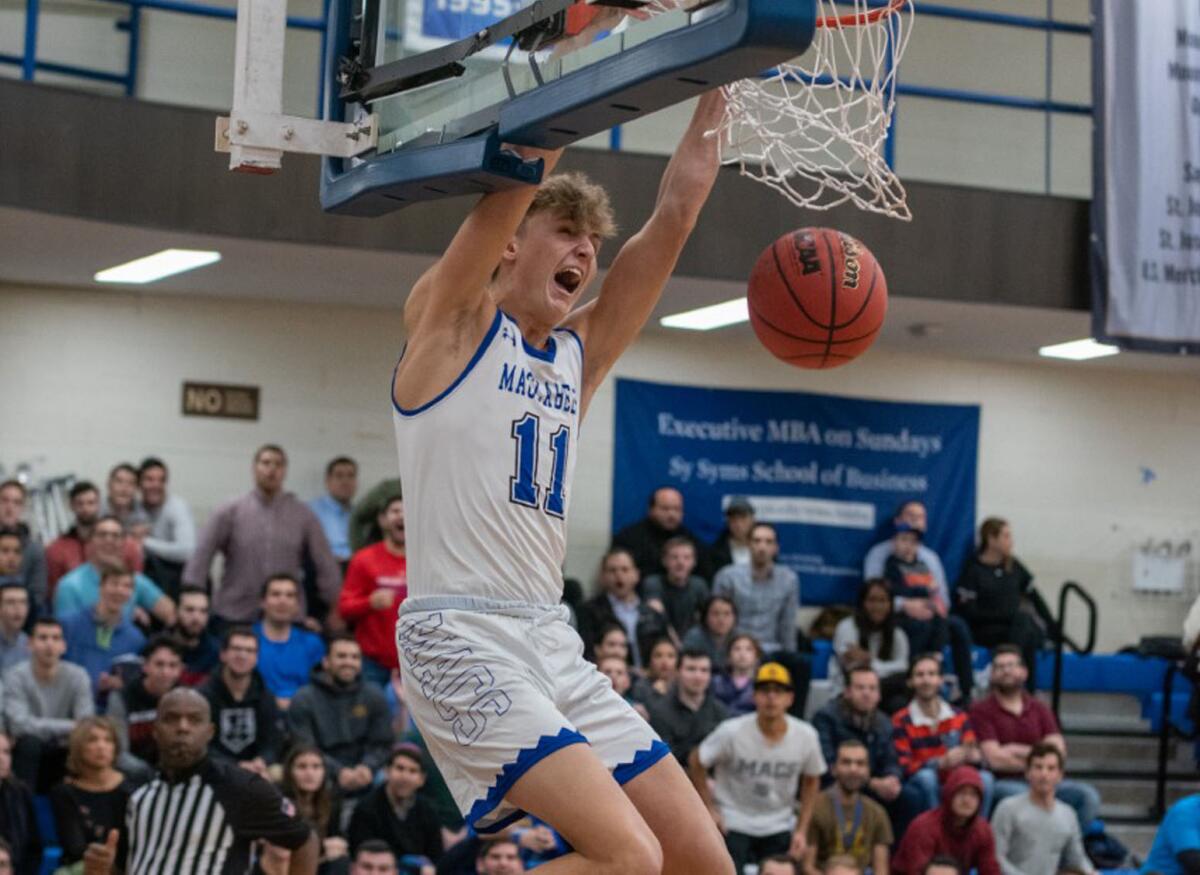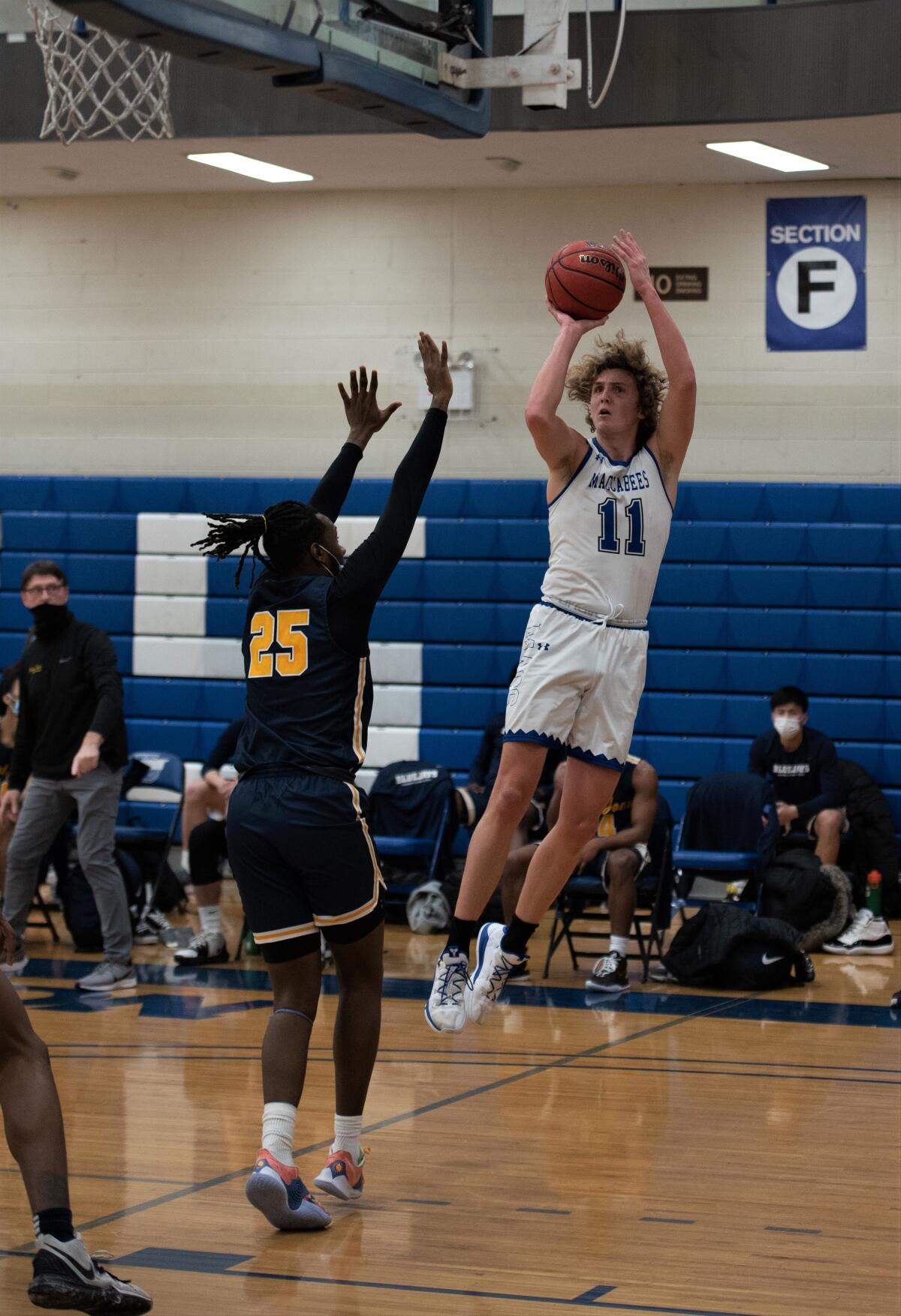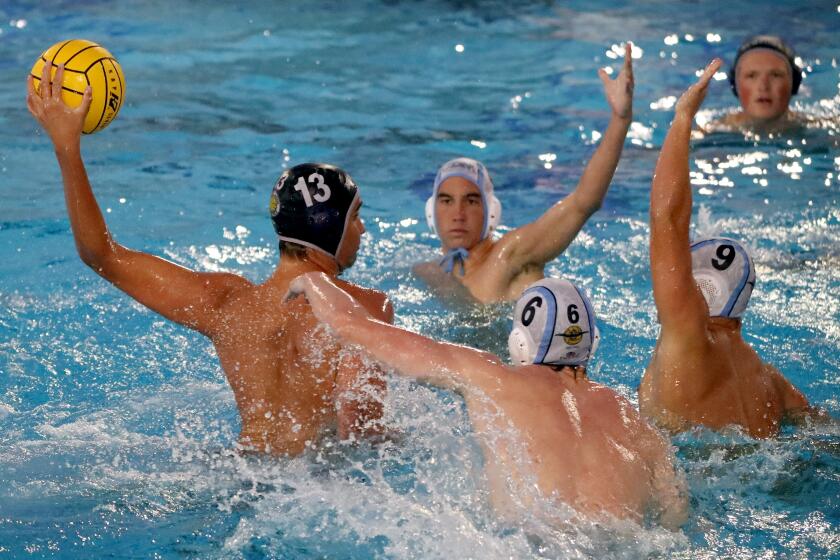Next ‘Jewish Jordan’? Can L.A.’s Ryan Turell be the first Orthodox Jewish NBA player?

- Share via
It wasn’t yet dawn on the morning of March 13, 2020 when Ryan Turell settled into the back seat of a blue-gray SUV destined for BWI Airport outside Washington D.C. The day should have been a joyous one: The sophomore wing for Yeshiva University had scored 71 points in back-to-back Division III NCAA tournament wins, and the Maccabees, historically a sub-.500 team, had advanced to the Sweet 16 and were cresting toward their first Final Four.
But the afternoon before, the onset of the coronavirus and the accompanying shutdowns had forced the cancellation of the entire tournament. Faced with the possibility of being stuck across the country from his parents at the start of a pandemic, Turell scrambled to book a one-way ticket to his Los Angeles home. As he sat in I-95 traffic, however, he stewed about his lost opportunity.
“I was in shock,” he says. “We had this amazing season without an ending, and I didn’t how to process it.”
The car’s driver was Harold Katz, an unofficial scout for Yeshiva and the former coach of Tamir Goodman, the much-celebrated guard from the late 1990s whose nickname, “The Jewish Jordan,” highlighted both his skill set and unique background. Katz remembers Turell “wallowing in self-pity.”
Turell’s field goal percentage during the tournament (77%) had attracted national notice that was now destined to be a footnote in some record book, and NBA scouts would have to wait another year to fully evaluate Turell. But as Katz pulled into the BWI departures lane, he assured Turell that the scouts would return, that his quest to be the first Orthodox Jewish player in the modern-day NBA had not diminished.

“I’ve always said that the Jews as a people are not as gifted athletically as others,” Katz said, “but the world is much more sensitive to differences in people than they were 20 years ago. No one took Tamir seriously, but the timing is right for a player like Ryan, who is a Swiss army knife.”
Turell spent a longer-than-expected offseason hoisting hundreds of three-pointers at Valley Torah High in Valley Village, not stopping until he had knocked down 500 of them. He added 25 pounds to his 6-foot-7, 195-pound frame before the Maccabees finally returned to the court last month, picking up where he left off in last year’s tournament. He is averaging 26.0 points per game for Yeshiva, which is in the midst of a 37-game win streak, the NCAA’s longest, dating to last season.
Get the latest on the SoCal high school sports experience, including scores, news, features and a behind-the-scenes look at what makes prep sports so popular.
Turell can score from deep (42% from three) as well as get to the rim (a highly efficient 1.4 points per play, per Synergy Sports Technology), and he is a multi-positional defender, able to lock down guards and bigs alike.
“I can do whatever I want at the Division III level,” Turell says.
::
Turell has held his own during summer games in Woodland Hills against Amari Bailey (the third-ranked recruit in the 2022 class and currently at Sierra Canyon), Jordan Schakel (San Diego State), Johnny Juzang (UCLA), Kihei Clark (Virginia) and Alfonzo McKinnie (now with the Lakers.)
“I was a sponge,” he says. “At the next level, you have to fill a role. Not everyone understands that, and that’s why they don’t make the next level. It was a good learning curve for me to be the shooter, and absorb from Alfonzo how to always be in the right spots.”
At least two NBA teams have requested game tape of Turell, and one league executive says, “Ryan is certainly on the radar.”
“[Yeshiva] has some guys that are good,” says one rival coach, “but there is a reason they went to Yeshiva. Ryan Turell is not one of those guys. He shouldn’t be at Yeshiva. How do you miss on him?”
Unlike the Miami Heat’s Duncan Robinson or the San Antonio Spurs’ Derrick White — under-recruited players who had to prove themselves at a lower level before making the leap to Division I — the Yeshiva junior was a fairly known commodity for much of his life. Turell’s father, Brad, grew up competing against Kiki Vandeweghe, then later became the NBA All-Star’s agent and publicist, bringing his youngest son to Vandeweghe’s backyard to shoot hoops.

The Turell family had a laser-focused goal: to get Ryan a Division I scholarship. By his fifth birthday, he had a shooting and dribbling coach, and while he enjoyed tagging along with his older brother to various playgrounds near the family’s home, he sought out more challenging competition. He heard that afternoon games at the Van Nuys LA Fitness on Sepulveda and Oxnard drew both Division I players and pros.
Turell was intimidated at first. Sure, he had run the court Saturday evenings after Shabbos at the Hebrew academy in Sherman Oaks, but he “played for fun, and it wasn’t good competition.”
“If you didn’t win on Sepulveda, you’re off for at least five games.”
Turell’s parents had converted to Orthodox Judaism before he was born, and he was initially reluctant to wear his kippah during those pickup games. “I didn’t realize the importance of it, and I didn’t take much pride in wearing it,” he says. “It was the double whammy — being white, and wearing the kippah.”
Then a wispy 145 pounds, Turell “thought I’d always get picked last, or guys wouldn’t get me the ball. I felt isolated.”
By his sophomore year, he had enrolled at Valley Torah and while he was still “too small and skinny,” he successfully tried out for Earl Watson Elite, one of the West’s premier AAU programs. He wasn’t the star attraction — that would be Sierra Canyon’s Cassius Stanley, now of the Indiana Pacers — but college recruiters soon flocked to the small religious school in the Valley, a K-12 school of no more than 100 students, to watch Turell, who was throwing down 360-degree tomahawk dunks and establishing himself as a consistent deep threat.
“I love wearing my kippah and have everyone call me ‘Jewboy’ when we walk into gyms, and they don’t realize they can’t beat us.”
— Yeshiva’s Simcha Halpert, teammate of Ryan Turell
Turell was a big fish in a small pond but not one in which he was alone. There was talent in the Heritage League, in which Valley Torah played, as well as across Los Angeles, including Division I players Wes Slajchert (Dartmouth via Oak Park), JoJo Fallas (Cornell via Shahlevet) and Jordan Cohen (Lehigh via Campbell Hall).
Stanford was interested in Turell, who averaged a triple-double his final two years of high school, and floated the idea of saving a roster spot for Turell if he walked on. Other programs were more aggressive; Air Force, UC Irvine, and Cal State Northridge offered scholarships. Eventually, Turell committed to Army. He was enticed by the handwritten letters that arrived almost daily, as well as the proximity of an Orthodox rabbi who served as West Point’s Jewish chaplain, and a kosher restaurant that delivered.
Almost immediately, he knew that he made a mistake. As had been the case with Goodman, who received a scholarship offer from Maryland, faith-related stumbling blocks surfaced, including Army training on Shabbos, and Turell decided to look elsewhere. So where, then? Cal Poly? Southern Utah?
No.
Yeshiva University doesn’t offer scholarships and has a dual curriculum of religious and secular studies. Brad Turell recalls telling his son: We did this for years — the training, the AAU, the summer camps. If you just wanted to go to Yeshiva, we didn’t need to do any of that.

Yeshiva coach Elliot Steinmetz had a simple enough pitch: to create a culture of Jewish athletic excellence. As Simcha Halpert, a senior guard on the 2020 squad that went 29-1, explained, “We set a trend of coming to Yeshiva for basketball and only for basketball.
“I’ve talked to YU alumni, and they used to get demolished. I love wearing my kippah and have everyone call me ‘Jewboy’ when we walk into gyms, and they don’t realize they can’t beat us.”
What makes Yeshiva so challenging is Steinmetz’s style of play, one mined from Bobby Knight’s Indiana playbook and tweaked to fit a brand of basketball in which player movement is paramount. There are few play calls, and the team’s offensive canon is “2+1,” or at least two ball reversals before a field goal attempt.
“About 99 percent of the country runs ball screen action, in which you bring action to the ball,” Steinmetz said, “but we bring ball to action. You can scout our players, but you can’t scout how we move on the court.
“The seriousness with which these kids take the game has jumped tremendously. Tamir blazed the trail, and now more and more kids are trying to follow that dream.”
::
Goodman, the trailblazer, acknowledges the loneliness he encountered whenever he entered an AAU gym or tournament. “A lot of times, it was just my coach and I,” he says from Israel, where he runs basketball camps and is a motivational speaker and consultant. “We’d arrive at a Nike or Adidas camp, and I’d be the only person with a kippah. I’d be told to throw down a dunk in warmups so the person who invited me to the camp or tournament wouldn’t be embarrassed. That they hadn’t made a mistake.”
As a high school senior, Goodman was ranked as high as the nation’s 25th best player in his class, earning him the “Jewish Jordan” sobriquet from Sports Illustrated, and committed to play for Gary Williams at Maryland. Unable to reconcile the schedule with the demands of his faith — Orthodox Judaism does not permit non-religious activity between Friday and Saturday sundowns — he enrolled instead at Towson State in Maryland, where he started his freshman season and averaged six points.
The next year, following the firing of the coach who recruited the guard — and had put together a schedule to accommodate his star newcomer’s faith — Goodman filed a complaint against the new staff, alleging abusive behavior (no charges were ultimately filed), and left the school to join an Israeli pro league, where he played for nearly a decade before retiring in 2009.
“A lot of kids can now be proud Jewish basketball players,” Goodman says, “but back then, I was just a curiosity.”
Prep Rally delivers hot teams, highlights and answers to readers’ questions — the most thorough, dialed-in high school sports coverage in California.
Turell has embraced that pitch with zeal: “We’re serious. Jews can play basketball. I made a decision to really be a part of something special, to be a Jewish hero and to create the dream — a basketball culture for Jews — and make this program, which had been seen as a joke, a high-major one. Coach’s goal when he recruited me was to win a national title.”
In any other year, that title would be attainable, but the challenges of playing in a pandemic means that for the second straight year, the junior’s March Madness dreams will be deferred — earlier this month, the NCAA announced the cancellation of championships for Division II and III winter sports.
There had been talk of forming an ad hoc postseason tournament in which up to 16 of Division III’s best teams would bubble up to play. Like last March, frustration has grown in the absence of any resolution, but for Turell, the team, and its supporters, their faith is more cemented in the eternal. “Maybe 50 years from now, Jewish kids will begin to understand the magnitude of what this team has been able to accomplish, watching Yeshiva play the way they play,” says Goodman.
For the present, though, Turell, like Goodman, recognizes the weight on his shoulders when his admirers and the NBA are watching, so he aims to keep it simple.
“I’m ready to make history.”
Matt Giles is a freelance writer who has contributed to several publications, including OneZero, Inside Hook, Deadspin, Longreads, and New York Magazine.
More to Read
Go beyond the scoreboard
Get the latest on L.A.'s teams in the daily Sports Report newsletter.
You may occasionally receive promotional content from the Los Angeles Times.












